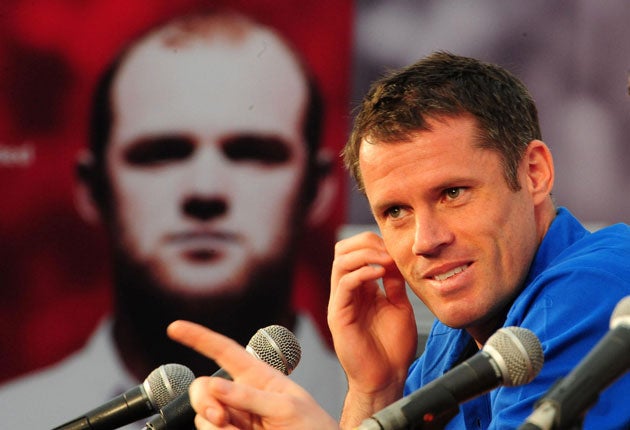Forget the past and watch Capello make history, says Carra

Your support helps us to tell the story
From reproductive rights to climate change to Big Tech, The Independent is on the ground when the story is developing. Whether it's investigating the financials of Elon Musk's pro-Trump PAC or producing our latest documentary, 'The A Word', which shines a light on the American women fighting for reproductive rights, we know how important it is to parse out the facts from the messaging.
At such a critical moment in US history, we need reporters on the ground. Your donation allows us to keep sending journalists to speak to both sides of the story.
The Independent is trusted by Americans across the entire political spectrum. And unlike many other quality news outlets, we choose not to lock Americans out of our reporting and analysis with paywalls. We believe quality journalism should be available to everyone, paid for by those who can afford it.
Your support makes all the difference.Even in his moment of greatest estrangement from England, when he declared in a searing critique of the national side in his biography that "a superiority complex" has developed in which "it's presumed England should go close to winning every World Cup", Jamie Carragher had a curiosity bordering on fascination with what Fabio Capello might bring, that other managers had not.
Now, after nearly a month here observing Capello ride the World Cup Big Dipper and still not get giddy, Carragher is in a position to tell us what he has seen. "The main thing I've observed is that after the first few games there were questions, but he never gets fazed or looks panicky," Carragher says. "He always looked totally in control as if he always felt we would get through."
This is the most honest account of Capello we are likely to get given that the man himself, with his still broken English and reluctance to offer more than a few minutes of occasional insight, remains more remote to us than any national manager who has gone before.
Grace under pressure is a different proposition today, of course. Look at virtually any of the statistics, as Carragher, the most studious observer in England's squad, has done, and there is a reason to fear. Do we really need to ask whose four penalty shoot-out wins in World Cup finals is a record? Or who shares, with Italy, the record for most losses in them?
Carragher has seen most of those in some shape or form. The 1986 finals were the first he watched and he was 12 on the night of 4 July, 1990, a date still seared on the England psyche. "I remember watching it in the living room and just remember all the things: Lineker's equaliser, Lineker's face when Gazza got the yellow card and obviously the penalties. When it goes to a penalty shoot-out it's a bit more unfortunate but the penalties they took that night were all top drawer. They all seemed to be in the top corner just away from Shilton."
But Carragher's many assets to the England camp – one of them being his willingness to talk with a candour and intelligence which lifts the soul in these days of media management – is an appreciation both of the present and the distant past, where Germany is concerned. Carragher was also a late substitute in Sven Goran Eriksson's greatest hour in Munich in September 2001 and is acutely aware of how injury ravaged the England side was that won 2-1 in Berlin in November 2008 – on Fifa rankings, the best result in Capello's two-and-a-half-year leadership. So this is not a time for us to be dwelling on the games of the VHS era. "It's always seemed that when we've come close they've seemed to stop us," he says. "But all the defeats at World Cups and European Championships were years ago," he says. "If you are facing a team you should look at your recent record against them."
A glance at the team sheet from Berlin – a midfield of Barry, Carrick, Wright-Phillips and Downing; up front Defoe and Agbonlahor – bears him out. It helps when there are no penalties, of course – Carragher, when asked to take his first penalty in competitive football in Gelsenkirchen against Portugal four years back, missed it. You sense he won't be taking the long, 30-yard walk this time. "The same six or seven players take them regularly in training and once you see the team I think it will be easy to work out," he says.
Capello seems ready to keep Matthew Upson in ahead of Carragher today, though England's defensive record with the Liverpool defender back in the fold could not be better – no goals conceded in Carragher's 225 minutes of football for Capello. It was for the promise of days like today that he abandoned his international purdah. In that biography he also said the nation should forget former glories and take strength from embracing the underdog role. But now the day dawns, he – like Capello – has a clearer mind. "Sometimes, when you have an underdog, that team sits back and looks to play the counter-attack," he said. "But this is the kind of game that both teams will think they can win. It won't be a case of us going for it gung-ho, but we will be positive."
Join our commenting forum
Join thought-provoking conversations, follow other Independent readers and see their replies
Comments